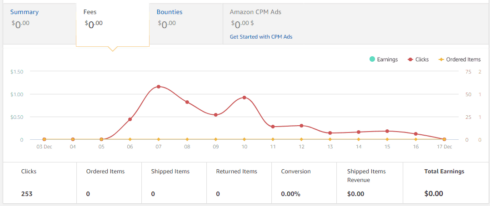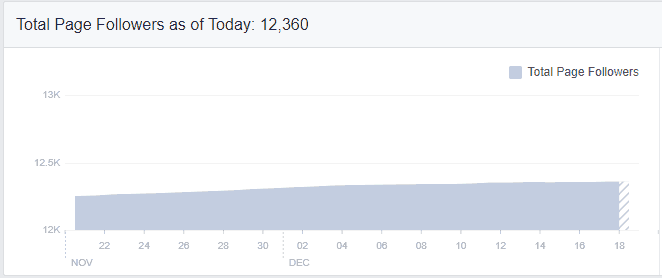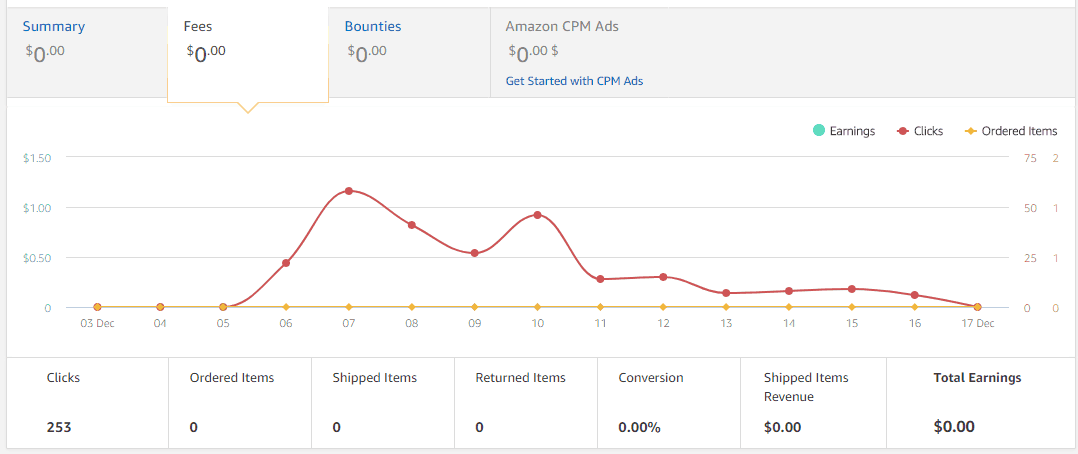How to Share Amazon Affiliate Links on Facebook

A while back, I shared my plans to start the social media project.
In a nutshell, I plan to try various strategies to build a social media following outside of Niche Pursuits and see what kind of revenue I can generate from that social audience. In my last post, I explained exactly how I built a brand new Facebook page to over 10,000 followers in just 17 days.
Now that I have a good core audience, I want to start testing out different ways that I might be able to monetize it. Then figure out which strategy works best. So, about a week ago, I began my first experiment.
This was designed to figure out how to promote affiliate links on Facebook effectively.
Today, I'm going to share how well I was able to monetize this audience over the past 7 days. As well as what some of my experiments will be in the future.
Spoiler alert: my attempt to promote affiliate links on Facebook didn't go as well as planned.
Facebook & Affiliate Links
Understanding how to promote affiliate links on Facebook isn't easy and as the study will show. There was a learning curve.
It isn't against Facebook's policy to toss in an Amazon affiliate link. But finding a profitable way to make it work is the key.
This would prove to be more of a marketing challenge than I originally thought.
How Big Is My Facebook Audience?
As part of the social media project, I want to keep you updated on the growth of my social media following and then of course the revenue generated.
Although I put a pause on aggressively growing this Facebook page (until I figure out how to monetize it), it still has been growing a little bit. No ad campaign any time soon 🙂

So, that is an additional 1,500 since the last time I reported. Not bad since we did not do anything at all to gain these followers other than post a few times a day on our Facebook page.
We could grow it much faster if we wanted to spend a little money. But for now, I want to figure out how to monetize the audience before I throw money into any Facebook advertising.
The Organic Affiliate Promotion Experiment
As I thought through different ways that we could try to monetize this audience, I figured we should start with the easiest and then move up the difficulty scale as needed.
The easiest experiment to do was simply posting affiliate links on our Facebook page. So that's what we did.
We have been posting memes or articles or other thoughts about 3 to 5 times a day for the past month. The engagement has been really good.
So, all we did was swap out a couple of those regular posts with promotional posts that included an affiliate link.
We simply linked to an Amazon product with a special Amazon tracking ID so that we could see exactly how many clicks there were.
However, there was one small twist. Because I happen to sell some physical products on Amazon related to this niche, I linked with an affiliate link to my own products and offered a coupon code.
So, in our Facebook posts we basically said, "Hey, check out this product and take 10% off when you use coupon code "10percent."
I figured, we could get a little affiliate commission and sell some of my own physical products…win, win!
So, how did the affiliate offer experiment turn out? Not that great to be honest.

As you can see that in just over a week period of time, I was able to send 253 clicks this particular Amazon tracking id (which was set up specifically for this experiment). Unfortunately, I didn't make a single sale. Ouch!
Now, I could try to hide how bad this experiment went, or I could try to figure out if there is a better way.
As I look back, I'm not surprised at how poorly it did. After all, usually, the easiest ways to do things don't end up being the best way to do things.
So, lesson learned: posting a bunch of affiliate links straight to your Facebook audience isn't a great way to monetize that audience.
If you were hoping that would be enough to make some affiliate commission, it's time to move on to the next strategy.
But that is what this project is all about. Trying different things to see what works and what doesn't.
In it's current form, I wouldn't recommend posting affiliate links straight to your audience in order to monetize it.
You won't be creating floods of affiliate revenue that way. There's got to be a better way.
I didn't make any sales directly through my affiliate link. However, it DOES appear that those social media posts did drive 1 sale. In my Amazon seller report, I can see that the coupon code that we only shared on social media was redeemed one time.
So, technically I did make about $40 from this social media experiment by selling one of my products. I'm not sure why Amazon associates didn't track it. But clearly the coupon used was an affiliate offer only shared on social media.
Then, How Do You Promote Affiliate Links on Facebook?
Clearly, I've found one way NOT to promote affiliate links on Facebook. Perhaps there is a better way, but I'm still searching for it.
From what I see, my engagement rate would go way down every time I posted an affiliate link.
So, if you want to quickly kill the engagement of your audience, post more affiliate links. I think I would be okay with posting 1 in 10 posts with an affiliate link. No more than that.
As you can see, even that 1 in 10 probably isn't going to get you very good results if all you are doing is literally posting the link with a short description.
I'm going to attempt to figure out some better ways to monetize my Facebook audience with a few experiments in the future. My hunch is that promoting affiliate links directly on Facebook will never work very well. But building an audience and getting them into a private Facebook group or onto an email list and then monetizing from there will work much better.
In other words we're looking for indirect affiliate marketing to convert Facebook traffic into actual affiliate sales.
Can I Post Amazon Affiliate Links On Facebook?
Yes, but only as long as you don't use ads to promote your content. This includes ads straight to Amazon, but leaves boosted posts to your Facebook page in a bit of a grey area. I wouldn't do them.
But as I've showed you in this post, I haven't had good success with Facebook anyways! I think it's due to the nature of Facebook. People use social media to reconnect and be entertained. What are the odds that someone is looking to buy the cordless electric lawnmower (or whatever product) that I just sent them a link to?
Not very high.
Even if someone is interested, I think that affiliate marketing is tough for Facebook. The fact Facebook's network has tons of ads now doesn't help. Every few posts, we run into very targeted ads for people who do want to buy.
Looking back, I think that affiliate links look a bit spammy. These could very well be annoying for users, hence the lower conversion numbers.
Alternatives To Facebook For Affiliate Marketers
Facebook affiliate marketing might be allowed, but you'll struggle to make direct sales. A Facebook post can get some traffic but making the affiliate sale is another matter entirely.
While the paid ad route is out, there must be a better strategy.
Since Facebook didn't work out that great, I thought there may be some other avenues that I could try out.
Here are a few ideas:
My Next Experiment: Contest!
So, for my next experiment, I plan to try a contest. I've run several contests before, so I know with a little bit more confidence that this should have a better result. (Getting more than $0 would be a better result in this case).
In fact, even getting a new email on an email list would be a better result than I did with posting affiliate links right on my Facebook page!
The Plan
- Run a contest to giveaway a free product. In my case I will be giving away one of my own physical products that I manufacture and sell on Amazon. However, you could just as easily give away any product that exists on Amazon. You would just buy it and ship to the winner when the contest is over.
- The contest will run 7 days.
- In order for someone to be eligible for the free product, they have to input their name and email address ( building an email list without a website! )
- Entrants get more "points" for sharing the contest on social media or via email. I'll be using contest domination to manage the contest.
- At the end of the contest, I'll announce the winner and ship them the free product. However, I'll also offer a discount to anyone that didn't win. I'll link to my product on Amazon through an affiliate link to track everything.
- I'll also have an autoresponder series that goes out to everyone that joined the contest. They are now on my email list and I'll try to monetize that email list through the autoresponder series.
That's the plan in a nutshell. Get people on my email list and then sell products.
Yes I will try to add some value through the email list as well, it won't be pitches 100% of the time.
As part of this experiment, I will also be spending a little bit of money to "boost" my post on Facebook about the contest. This will ensure that this contest page gets in front of more eyeballs and eventually results in more contest entrants.
I hope to start running this contest in the next few days. However, with the holiday season upon us, I might not be able to report on anything until the new year.
Update: The contest was awesome! You can either read about the Facebook giveaway contest there or read how Travis Ketchum uses contests to collect six figures' worth of emails.
My Long Term Strategy: Collect Email Opt Ins
I've been collecting email opt ins on my sites for a while now, but it's a strategy that I work with more than ever today. I use it on Niche Pursuits, Niche Site Project 4, and all of my non-public websites.
Having an email list is one of the most powerful things you can do for your site.
You can send some affiliate offers straight to your email list or (in the case of Amazon) send your list to your review/buying guide articles that are monetized. You can get a huge chunk of traffic to new articles and build relationships with an email list.
This is the tactic that proves to be a gold mine in any and every niche site. The more emails I send, the more money I make.
New Strategy: Pinterest
Facebook has become more and more pay to win in the past few years. There are just far less opportunities to turn Facebook traffic into affiliate revenue than there used to be. Pinterest has a very active community that aren't shy about making a purchase when the right affiliate offer comes along.
Now I do almost all of my social media work on Pinterest. It's a social media channel that has done really well for me.
Niche Site Project 4 doesn't even have a Facebook page, but it does great on Pinterest. You can read a NSP4 update here.
For each new post I made on NSP4, I'd pin 2 images to Pinterest with links to my content. It proved to be a solid source of traffic for my site.
There's a lot of chatter that in many cases the best affiliate marketing strategy using social media is going through Pinterest. It's a social media platform that just converts really well for your average affiliate marketer.
How to Promote Affiliate Links on Facebook: What We've Learned
We've definitely learned that monetizing your Facebook traffic is going to be a bit more challenging than a blog post. With a good blog post you can toss up the Amazon affiliate link and get that sale.
Not so much on Facebook. Even with a Facebook group, which in theory is filled with your target audience, getting a sale from those clicks was challenging. To say the least.
Affiliate promotion on Facebook seems to be best when done indirectly. Run contests, grow your group, get those emails for your list. Drive them to your website where you're more likely to get a sale from your potential affiliate traffic.
Why Not Use Facebook Ads?
The reason you don't use a Facebook ad to promote an affiliate product is the fact that IS against their terms of service. That's a quick way to get into trouble and get your account banned.
You can place affiliate links for Amazon, Commission Junction, Clickbank, any affiliate program where advertising on Facebook isn't against their TOS, on a personal page or group page. Just not with a FB ad.
That's the one place where it's clearly not allowed by Facebook.
Future Plans And Your Ideas
In the future, I also plan on trying a few other things. These plans include launching a paid Facebook group and member's area for my niche, buying a social media account, and sending people to pages with more affiliate content or ads on them. I'll share more details as I go.
We'll see what works and what doesn't.
Overall, I'd love to hear your thoughts on my past and future social media experiments.

How to Share Amazon Affiliate Links on Facebook
Source: https://www.nichepursuits.com/not-promote-affiliate-links-facebook/
0 Response to "How to Share Amazon Affiliate Links on Facebook"
Post a Comment